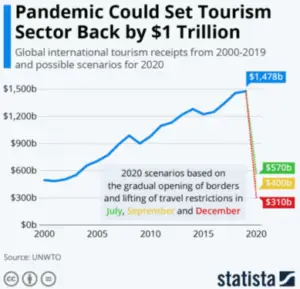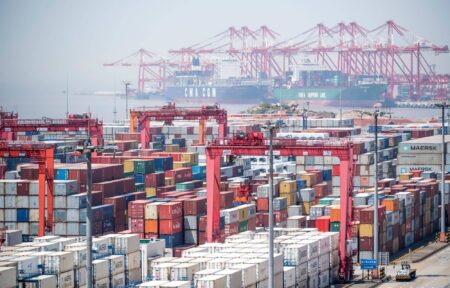The tourism industry is one of the sectors that has been greatly affected by the Covid-19 pandemic which increased cancellations of hotels and travel bookings which resulted in revenue loss and unemployment situations, resulting to loss of substantial revenue to governments and increasing incidence of poverty among others.
Egypt’s tourism revenue recorded $9.9 billion in the fiscal year 2019/2020 a decrease of $2.7 billion from the previous year, according to the Central Bank of Egypt (CBE).
The bank noted that the decline in travel caused a drop in the services surplus by 31.2 per cent to reach $9 billion in 2019/20 compared to $13 billion in the previous year.
According to the report, in the fiscal year 2019/2020, Egypt’s non-oil trade deficit decreased by $2 billion recording $36 billion compared to $38.03 billion recorded in the previous year. The bank said this was because of the hike in non-oil merchandise exports by $1 billion to $ 17.9 billion, an increase from $ 16.9 billion which in turn was caused by the rise in gold exports and the withdrawal of non-oil merchandise imports by $1 billion to $53.9 billion from $55 billion.
In the same period, the oil trade balance recorded a deficit of $421 million compared with a surplus of $ 8.1 million recorded in the previous year. The report attributed the decline to the decrease in oil exports by $3.1 billion to $8.5 billion from $11.6 billion which was brought about by the decrease in exports of crude oil and oil products as well as natural gas.

The report also added that the oil imports decreased to $8.9 billion a decrease by $2.6 billion from $11.5 billion.
Uganda also reported that it had lost about $1.6 billion in tourism earnings in the first six months of this year. Tourism is one of Uganda’s economic mainstays with the country earning about $2 billion from the economic activities in 2017 an increase from $1.7 billion in 2016. This year before the pandemic broke, the country had expected to receive about 1.5 million visitors. The International Monitory Fund (IMF) said that in the fiscal year 2019/20, Uganda’s tourism earnings were expected to fall by 54 per cent and decline by 52 per cent in 2021.
This greatly affected Uganda’s economy as the IMF nearly halved its forecast for economic growth in Uganda for the financial year ending in June to 3.3 per cent and projects 3.7 per cent growth in 2021.
Rwanda on the other hand lost $10 million or about 10 per cent of the estimated revenues in 2020 between March and April. In 2019, Rwanda generated around $498 million in tourism revenues. In the first quarter, Rwanda’s revenues from foreign visitors dropped by 35 per cent compared to the same period in the previous year.
After registering the first case of coronavirus, Rwanda banned tourism and hospitality activities and started encouraging domestic tourism to loosen the strain caused by the pandemic.
Rwanda’s president Paul Kagame expressed his appreciation for domestic tourism: “We were pleased to see so many Rwandan families and residents of Rwanda take the opportunity to enjoy domestic tourism. I hope this will continue, even as our guests from abroad travel here to discover our country’s attractions,” he said.
According to the World Travel and Tourism Council, domestic tourism is a key driver of the tourism sector globally.
Kenya also lost about $717.49 million within the first six months of the year due to Covid-19. According to the Tourism Cabinet secretary Najib Balala, the sector contributes about 10 per cent of the gross domestic product and was mainly affected by the ban of international flights and the restriction of movement that affected domestic tourism. In 2019, Kenya’s tourism earnings grew by 3.9 per cent as arrivals defied terror threats and global geopolitics to remain above the two-million mark.

In April this year, IATA estimated that due to covid-19, Ethiopia will have 2.5 million travellers resulting in $0.91 billion revenue loss, risking 120,400 jobs and $0.80 billion in contribution to Ethiopian economy.
The travel restrictions cost the tourism industry alone a loss of over $200 billion globally, excluding other loss of revenue for tourism travel and were forecast to cost the aviation industry a total loss of $113 billion according to the International Air Transport Association (IATA).
Hotels across the globe perceived booking cancellations worth billions of dollars and the hotel industry required a $150 billion bailout due to the pandemic.
According to the World Tourism Organization (WTO) 2020 report, the international tourism has indicated continued growth for the tenth consecutive year reporting 1.5 billion international tourist arrivals in 2019 and estimated 1.8 billion of international tourist arrivals by 2030.











